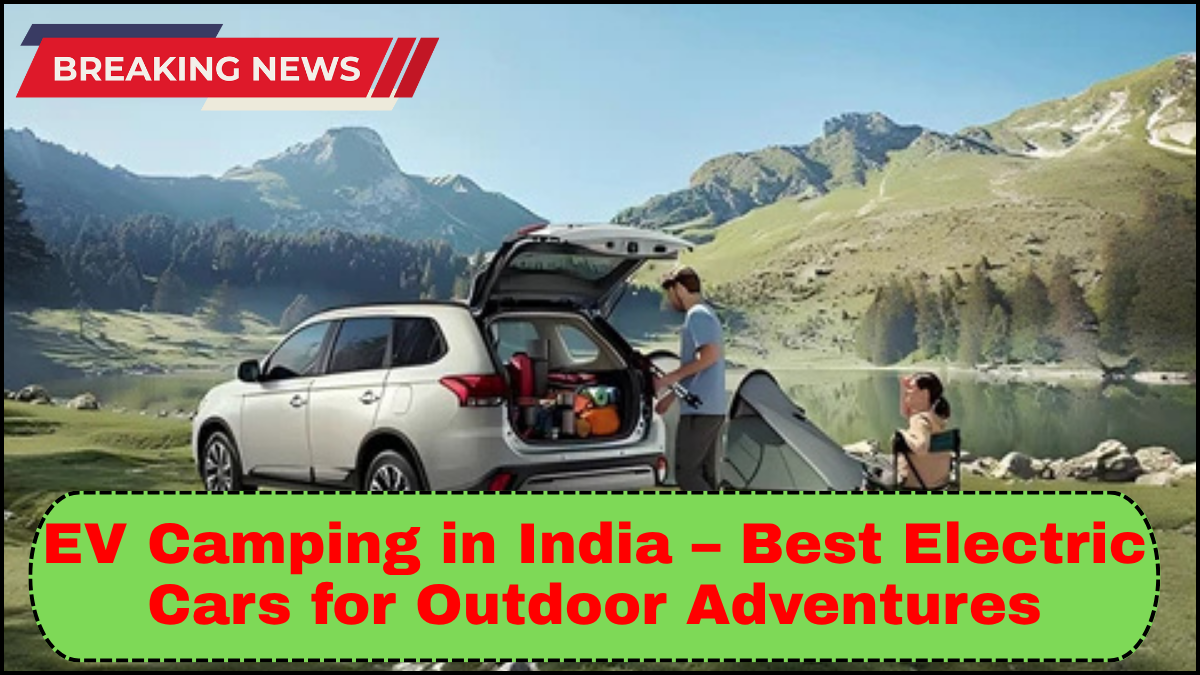Camping in an EV is no longer a far-fetched dream in India. As electric mobility expands across the country, electric vehicles (EVs) are becoming a serious option for outdoor enthusiasts. Whether it’s a weekend in the Western Ghats or a Himalayan road trip, modern EVs offer a silent, eco-friendly, and surprisingly capable way to experience the wild.

Let’s explore how EV camping fits into India’s travel lifestyle, and which electric cars are best suited for adventure on the road.
Why EV Camping Makes Sense in India
India’s electric vehicle infrastructure is developing rapidly. With growing numbers of fast-charging stations along national highways and in tourist destinations, planning a camping trip in an EV is more practical than ever.
Key advantages of EV camping:
-
Silent operation: Enjoy the sounds of nature without a noisy engine humming in the background.
-
Lower running costs: Charging is significantly cheaper than petrol or diesel, making long trips more economical.
-
Eco-conscious travel: EVs reduce emissions and support sustainable tourism.
-
Built-in tech: Most EVs come with advanced infotainment systems, regenerative braking, and app-based features that improve travel efficiency.
Best Electric Cars in India for Outdoor Adventures
Not every EV is ready to hit the hills or the coast. When choosing an electric car for camping in EV mode, factors like range, boot space, ground clearance, and charging convenience matter. Here are some of the top electric cars in India suited for the camping lifestyle:
1. Tata Nexon EV Max
Why it works for campers:
The Nexon EV Max delivers a real-world range of around 300–350 km and comes with a high ground clearance (205mm), making it suitable for mild off-roading. Its spacious boot can easily carry tents, backpacks, and cooking gear.
Bonus: With fast-charging capabilities, you can recharge up to 80% in just an hour—ideal for mid-trip top-ups at highway stations.
2. MG ZS EV
Why it stands out:
With a refined design and premium interiors, the MG ZS EV is for those who want both comfort and utility on their camping journeys. The 50.3 kWh battery offers a range of around 400 km. Its large panoramic sunroof is great for stargazing during overnight stops.
Extra feature: Advanced connected car features allow real-time monitoring of charge levels and trip stats—useful when planning long-distance camping routes.
3. Hyundai Kona Electric
Adventure factor:
While it sits lower than other EVs, the Kona Electric still delivers solid performance with a driving range of around 450 km. Its compact design makes it perfect for two-person trips or shorter camping getaways.
What makes it ideal: Smooth handling, efficient climate control, and a solid stereo system elevate the experience of quiet campsites and scenic drives.
4. Mahindra XUV400 EV
Budget-friendly and rugged:
Mahindra’s XUV400 EV is one of the more affordable long-range EVs in India. It combines a muscular SUV stance with practical battery life, offering up to 456 km on a single charge (as per ARAI). The spacious cabin and strong suspension make it a viable option for bumpy trails and hillside camping.
Planning an EV Camping Trip in India
To make the most of your EV camping journey, preparation is key:
-
Route Planning: Use apps like PlugShare or Tata Power EZ Charge to locate charging stations.
-
Pack Smart: Lightweight tents, foldable chairs, solar-powered lights, and portable stoves are EV-friendly choices.
-
Battery Strategy: Avoid deep-discharge cycles. Recharge when you hit 30–40% to avoid range anxiety.
-
Stay Connected: Choose a car with remote monitoring features or telematics for real-time updates.
Integrating EV Camping into Your Travel Lifestyle
EV camping in India isn’t just about the vehicle—it’s a lifestyle shift. Travelers who embrace this model often prioritize sustainability, flexibility, and minimalism. Whether you’re a solo adventurer or a couple seeking weekend escapes, EV camping lets you redefine freedom on your own terms.
With access to renewable energy, clean transport, and modern outdoor gear, India’s EV camping scene is quietly gaining momentum. More state tourism departments are promoting eco-tourism zones, and EV-friendly trails are starting to appear near wildlife sanctuaries, hill stations, and coastal areas.
Frequently Asked Questions
Q1: Is EV camping feasible in remote areas of India?
Not all remote areas have charging infrastructure, so plan routes carefully. Keep to locations within 150–200 km of known charging stations unless you’re using a vehicle with extended range.
Q2: Can EVs power camping equipment?
Some EVs support Vehicle-to-Load (V2L) tech (like the Kia EV6), but most Indian EVs don’t offer this yet. Use portable solar panels or battery packs as backup power sources.
Q3: How do EVs perform in hilly terrain?
Modern EVs handle hills well due to instant torque. Models like the Nexon EV and ZS EV offer hill-hold functions and regenerative braking, making them suitable for slopes.
Q4: What should I pack for an EV camping trip?
Carry a portable charging cable, tire repair kit, power bank, navigation tools, sleeping gear, and emergency snacks. Minimalist, high-efficiency gear works best in EVs due to limited boot space.
Q5: Are EVs safe to camp in overnight?
Yes, if parked safely and ventilated. Avoid running the AC/heater overnight on battery mode to conserve charge.
click here to learn more